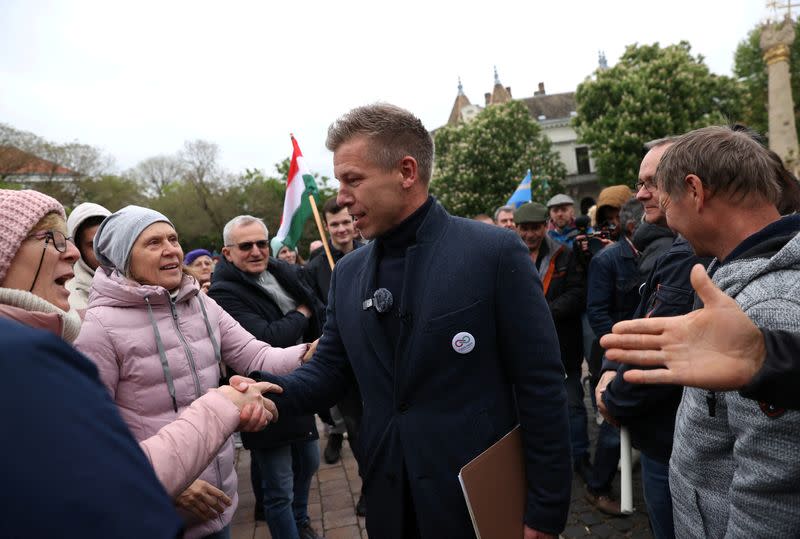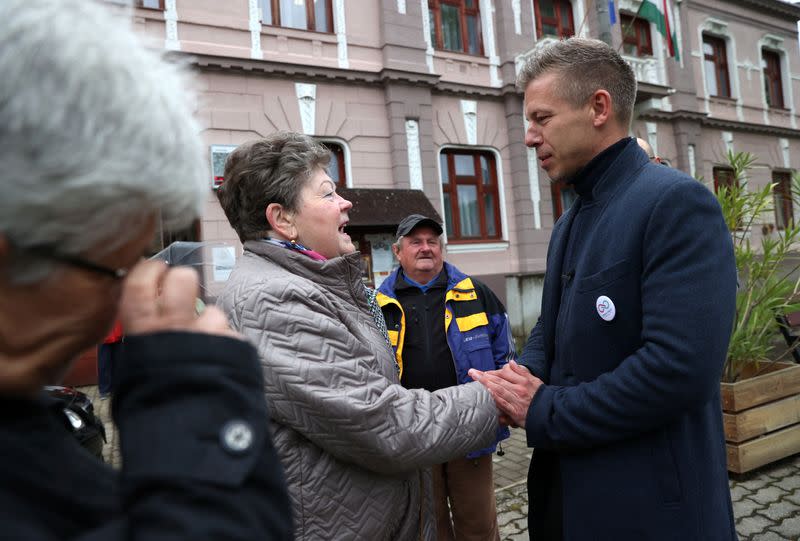Hungary's media-savvy newcomer aims to disrupt political status quo
By Anita Komuves
BUDAPEST (Reuters) - Peter Magyar was taking selfies with supporters in front of a busy Budapest market hall one Saturday morning last month when he asked them to give him a minute.
He took out his phone, started a live Facebook video and announced that his Tisza party had collected enough signatures to run in elections to the European Parliament in June.
It was a move typical of the media-savvy former government insider who has emerged in the last few months as what some observers see as the first serious threat in years to Hungary's nationalist prime minister, Viktor Orban.
Since reviving Tisza in February, Magyar, 43, has attracted big crowds to rallies at which he has accused the government of corruption and running a propaganda machine.
The government denies the allegations but Magyar has tapped into voters' frustrations with Orban, who has also alienated many of Hungary's European Union allies with his stance on Russia and moves that they say stifle democratic processes.
"Peter was able to give many people a chance to hope, that maybe one day this will end," 45-year-old Melinda Czink said at a campaign rally at the southwest town of Dombovar, complaining that she was fed up with the government's "propaganda and hate-mongering".
Tisza (Tisztelet es Szabadsag - Respect and Freedom) had been inactive until Magyar relaunched it, but it has already become the biggest opposition group, opinion polls show.
Magyar's popularity has risen rapidly since he accused Orban of widespread corruption in an interview shown on the YouTube channel Partizan in February, clocking more than a million views within days in a country of less than 10 million.
"At the time, I had no idea what was going to happen," Magyar told Reuters on a busy Budapest street as he collected signatures to run for the European Parliament.
"I did not expect to be here, or to lead a European Parliament election list."
Magyar hinted that success for Tisza in the European Parliament election might open the door to an early election in Hungary although polls put Orban's Fidesz party clearly ahead and the next national election is not due until 2026.
"Hungarian people might not need to wait until 2026," Magyar said during a campaign stop in Budapest. "We will go to every county, to the smallest village ... we will build a new homeland brick by brick."
AN OPENING FOR THE OPPOSITION
Magyar worked for the foreign ministry and then the prime minister's office in Brussels before joining a state bank and then heading a student loan agency. He eventually became disenchanted with Fidesz over what he said was the corruption and state propaganda that he witnessed from the inside.
Orban, 60, has been in power for 14 years but Hungary's economy is in recession and a row over a presidential pardon for a man who helped cover up sexual abuse in a children's home has struck his family-values platform at its core.
A recent survey by pollster Median showed Tisza could win as many as 25% of votes cast in Hungary in the European Parliament election, second to Fidesz's 45%.
That is a sharp rise for Tisza from earlier polls which put it on around 14%. Those polls showed it largely drawing voters from other opposition forces as Magyar built support through campaign rallies and a big social media presence.
"The opposition electorate is super unhappy with the current opposition. There is a tangible, massive demand for change on the political supply side," said Gabor Toka, senior research fellow at the Vera and Donald Blinken Open Society Archives.
Magyar's popularity was evident when tens of thousands of people attended an anti-government protest on April 6 and marched on parliament, shouting "Orban resign."
Since February, Magyar has built a following of more than 270,000 on Facebook, the main social media platform in Hungary, where Orban has 1.2 million followers.
In March, Magyar received 2.37 million interactions on his posts compared to Orban's 811,000. The veteran prime minister has usually topped the monthly tally provided by news site Telex.
Magyar attributes his following to public dissatisfaction with mainstream news outlets as Orban faces accusations, which the prime minister denies, of quashing media freedom.
"Magyar realised that people have become more sensitive to propaganda, and voters resonate with his message about the need for an independent public service media," said Agnes Urban, an expert at think tank Mertek Media Monitor.
Magyar's rise has been accompanied by attacks from government-funded media, which have accused him of domestic abuse and receiving well-paid state jobs with the help of his ex-wife, a former justice minister. Hungarian authorities are investigating press reports that he accepted foreign funding.
Magyar has denied all the accusations against him.
(Reporting by Anita Komuves, Editing by Timothy Heritage)

 Yahoo News
Yahoo News 




